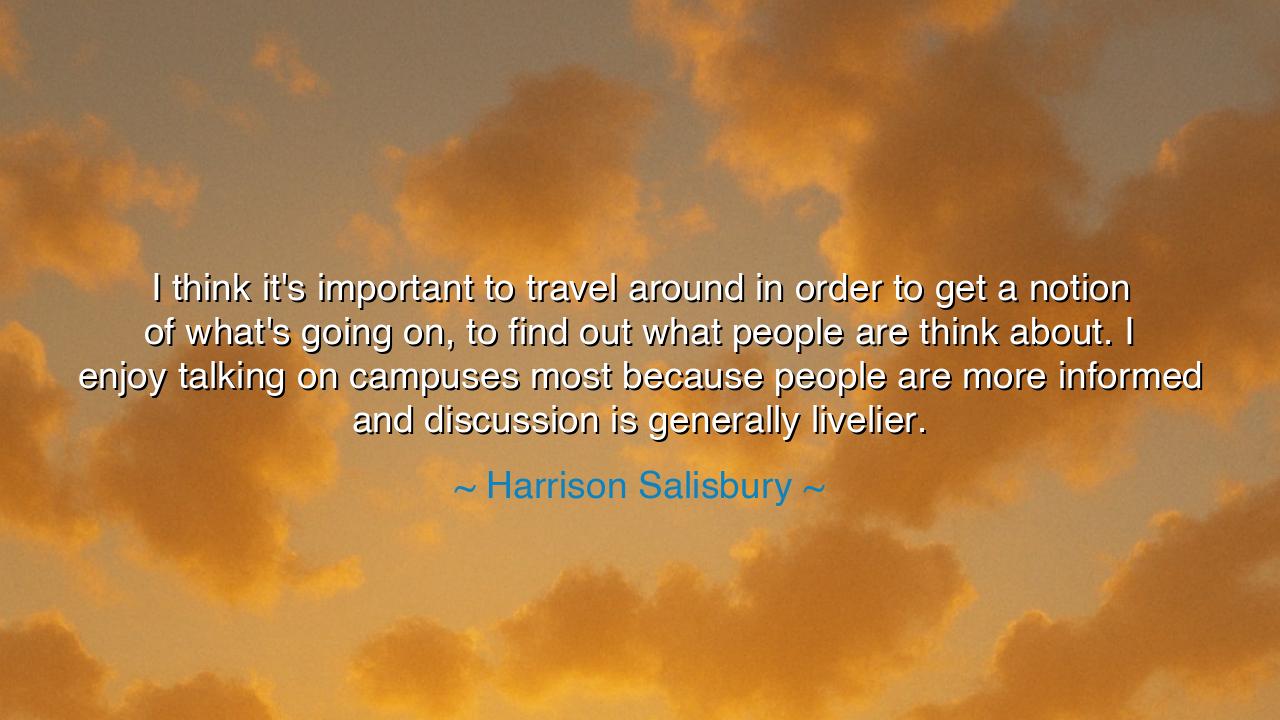
I think it's important to travel around in order to get a notion
I think it's important to travel around in order to get a notion of what's going on, to find out what people are think about. I enjoy talking on campuses most because people are more informed and discussion is generally livelier.






Harrison Salisbury, journalist and seeker of truth, once declared with noble simplicity: “I think it’s important to travel around in order to get a notion of what’s going on, to find out what people are thinking about. I enjoy talking on campuses most because people are more informed and discussion is generally livelier.” These words carry not merely the voice of a reporter but the wisdom of one who knew that truth is not discovered in stillness or isolation, but in movement, conversation, and encounter. To travel is to open the ears, to sharpen the eyes, to learn not from reports alone but from the living voices of the people.
The ancients knew this practice well. The philosophers of Greece did not remain in their homes but walked the agora, listening to merchants, soldiers, and scholars alike. Socrates made the streets his classroom, questioning cobblers and statesmen with equal vigor, believing that wisdom came not from ivory towers but from dialogue with ordinary men. Salisbury, in his journeys, followed the same path: traveling, listening, asking, and learning not only what people said but what their words revealed about the heartbeat of an age.
His mention of campuses is no accident. He recognized that the young, though lacking years, are often aflame with ideas and unshackled by cynicism. In the lecture halls and open quads, he found the freshness of thought that stirs lively debate, the courage to question authority, the daring to imagine worlds yet unmade. Just as in Athens the youth of Plato’s Academy pushed the boundaries of philosophy, so Salisbury cherished the students of his time as mirrors of society’s hopes and anxieties. Livelier discussion was not a nuisance to him, but a sign of a healthy mind, alive and searching.
History offers us many examples of this truth: that traveling to hear the voices of the people can shape both wisdom and destiny. Consider Abraham Lincoln, who spent years as a circuit lawyer in Illinois, traveling from town to town. It was in these journeys, listening to farmers, shopkeepers, and workers, that he developed the deep understanding of human concerns that later guided his presidency. Like Salisbury, Lincoln knew that to govern—or to report—with justice, one must first hear the unfiltered voice of the people.
There is also in Salisbury’s words a subtle rebuke to those who sit too long in distant chambers, relying only on filtered reports or distant summaries. A leader, a teacher, or a thinker who never travels risks mistaking shadows for reality. To get a notion of what’s going on requires the humility to leave one’s own comfort and meet others where they live, to hear not polished rhetoric but the raw truth of lived experience. It is in this act that genuine understanding is born.
The lesson is profound: truth is gathered on the road, not in the armchair. To know what the people feel, one must walk among them. To understand the present, one must engage in lively dialogue. To prepare for the future, one must listen to the voices of youth, for they often carry the unspoken dreams of tomorrow. Salisbury’s journeys were not only professional duties but acts of wisdom, rooted in the knowledge that human connection is the wellspring of insight.
Practically, this means that in our own lives we must resist the temptation of isolation. Seek out conversations with those outside your circle. Travel when you can—not only for sights, but for voices. Listen not only to the loud, but to the quiet. And when you find yourself among the young, welcome their fire, for their questions may carry truths older minds have forgotten.
Thus, Harrison Salisbury’s words endure as a teaching: travel, listen, and engage. For the world does not yield its truth to the passive observer. It reveals itself to the one who moves, who asks, who converses, and who honors the wisdom of others. In doing so, one not only finds out what people are thinking about, but also learns how to walk more wisely upon the road of life.






AAdministratorAdministrator
Welcome, honored guests. Please leave a comment, we will respond soon